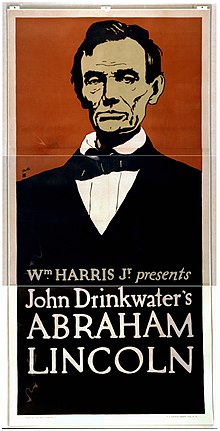Abraham Lincoln (play)
| Abraham Lincoln | |
|---|---|
 Poster for the Broadway production (1919) | |
| Written by | John Drinkwater |
| Date premiered | October 1918 |
| Place premiered | Birmingham Repertory Theatre, Birmingham, England |
| Original language | English |
Abraham Lincoln is a 1918 play by John Drinkwater about the 16th President of the United States. Drinkwater's first great success, it premiered in England in 1918. The 1919 Broadway production starred Frank McGlynn.
Production


A rare depiction of events in the life of a U.S. President by a British playwright, Abraham Lincoln was a great success in its day. The play covers events in Lincoln's Presidency from his election in 1860 to his assassination, but omits most of the events in his private life. Abraham Lincoln was first produced in October 1918[1] at the Birmingham Repertory Theatre, of which John Drinkwater was the artistic director. Arnold Bennett and Nigel Playfair acquired the play and its company for the suburban Hammersmith Playhouse, where Abraham Lincoln became a sensational success with London audiences. Irish actor William J. Rea starred.[2]
Produced by William Harris Jr., the Broadway production of Abraham Lincoln opened December 15, 1919, at the Cort Theatre, and ran for 193 performances. Lester Lonergan directed a cast including the following:[3][4]
- Leonard Mudie as Chronicler
- Florence Johns as Susan, a Maid
- Winifred Hanley as Mrs. Lincoln
- Frank McGlynn as Mr. Lincoln
- Forrest Davis as William Tucker, a Merchant
- Duncan Cherry as Elias Price, a Lay Preacher
- Penwood Batkins as James MacIntosh, a Journalist
- John S. O'Brien as William H. Seward, Secretary of State
- Charles Fleming as Johnson White, Confederate Commissioner
- William R. Randall as Caleb Jennings, Confederate Commissioner
- Paul Byron as John Hay, Lincoln's Secretary
- Frank E. Jamison as Salmon P. Chase, Secretary of the Treasury
- Herbert Curtis as Simon Cameron, Secretary of War, 1862
- Alfred Moore as Gideon Welles, Secretary of the Navy
- William A. Norton as Burnet Hook, a Member of the Cabinet
- David Landau as Edwin M. Stanton, Secretary of War, 1865
- J. Philip Jerome as Messenger
- Mary Horne Morrison as Mrs. Goliath Blow
- Charles S. Gilpin as William Custis
- Albert Phillips as General Ulysses S. Grant, Commander of the Federal Army
- George Williams as Captain Mallins, Grant's aide-de-camp
- Charles P. Bates as Dennis, an Orderly
- Raymond Hackett as William Scott, a Soldier
- Frank Ginter as General Meade, Field Commander, Federal Forces
- Thomas Irwin as Captain Stone, Meade's aide-de-camp
- James Durkin as General Robert E. Lee, Commander of the Confederate Army
- J. Paul Jones as John Wilkes Booth
Adaptations
In 1924, a two-reel sound film version of the play was filmed by Lee De Forest in his Phonofilm sound-on-film process. Frank McGlynn reprised his Broadway role.
In Czechoslovakia the play was broadcast on radio on November 8, 1937. Directed by Miloslav Jares, the production starred Frantisek Salzer in the role of Abraham Lincoln.[5]
Abraham Lincoln was adapted as the sixth episode of the CBS Radio series The Mercury Theatre on the Air, broadcast August 15, 1938. The cast included Orson Welles (Abraham Lincoln), Ray Collins (Grant), Edward Jerome (General Lee) George Coulouris (Hook), Joseph Cotten (Seward), Carl Frank (Scott), Karl Swenson (Hay), William Alland (Dennis) and Agnes Moorehead (Mrs. Lincoln).[6][7]
On May 26, 1952, the play was presented on television on the anthology series Studio One. Starring Robert Pastene and Judith Evelyn, the TV adaptation was notable for featuring actor James Dean in the small but significant role of William Scott, a Union soldier court-martialed and condemned to death for falling asleep on watch.[8] The live production survived on kinescope and is available at the Internet Archive.
See also
- Abraham Lincoln (1924 film short), two-reel short film made by Lee DeForest in Phonofilm
References
- ^ "Abraham Lincoln: A British Tribute to an American Hero". Current Opinion. August 1919. p. 93. Retrieved 2018-03-01.
- ^ Bennett, Arnold (1919). Introduction. Abraham Lincoln: A Play. By Drinkwater, John. Boston and New York: Houghton Mifflin Company. pp. ix–xii.
- ^ "Abraham Lincoln". Internet Broadway Database. Retrieved 2018-02-28.
- ^ "Abraham Lincoln: a drama by John Drinkwater". University of Iowa Libraries. Retrieved 2018-02-28.
- ^ http://mluveny.panacek.com/?p=2000
- ^ Welles, Orson; Bogdanovich, Peter; Rosenbaum, Jonathan (1992). This is Orson Welles. New York: HarperCollins Publishers. p. 345. ISBN 978-0-06-016616-8.
- ^ "Abraham Lincoln". Orson Welles on the Air 1938–1946. Indiana University Bloomington. Retrieved 2018-02-28.
- ^ Spoto, Donald (2000) [1996]. Rebel: The Life and Legend of James Dean. New York: Cooper Square Press. p. 104. ISBN 978-0815410713.
External links
- Abraham Lincoln (1919) at the Internet Archive
- Abraham Lincoln at Project Gutenberg
- "Abraham Lincoln" (August 15, 1938) on The Mercury Theatre on the Air, starring Orson Welles (Indiana University Bloomington)
- "Abraham Lincoln" (May 26, 1952) on Studio One (Internet Archive)
